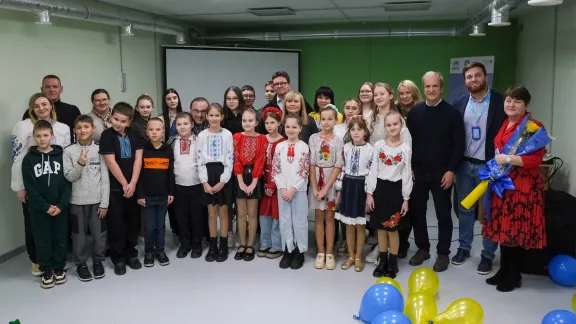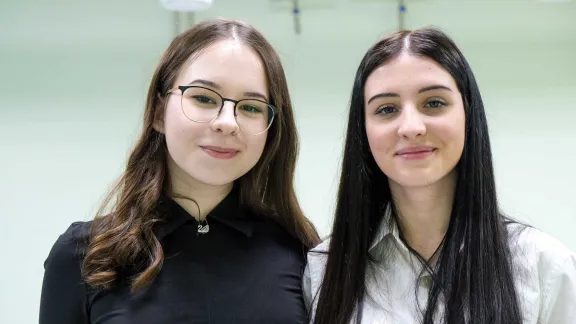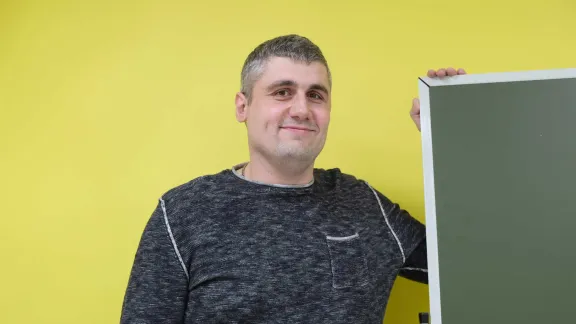
Students and teachers at the opening of the Pishanka school in Kharkiv. Photo: LWF/ L. Gillabert
"A chance to save a generation”
(LWI) – “It’s so exciting! I haven’t been in school for so long. I haven’t seen my friends for so long. I really like seeing my teachers!”
For three years, 14-year-old Anastasia Stoychan has been unable to attend school in war-torn Kharkiv, Ukraine, for safety reasons. To address this, the Lutheran World Federation (LWF) in Ukraine, in collaboration with the United Nations refugee agency (UNHCR) and local partners, has built underground classrooms, providing safe learning spaces for 3,885 students and school staff. The first two locations have now been inaugurated.
Life has been anything but normal for children in eastern Ukraine since February 24, 2022. Since the full-scale invasion, over 3,600 schools have been damaged, nearly 400 destroyed. In Kharkiv, three out of four students can only attend online. Many have been forced to spend hours sheltering in basements and metro stations. In the Kharkiv region, nearly half of all schools have been damaged or destroyed, which affects 40,000 students.
“This is priceless.”
A year ago, the city of Kharkiv launched the “Metro Schools” initiative—underground classrooms built in metro stations and other secure locations, where students can learn without interruptions from air raids. LWF, UNHCR, and local partner Silna Sprava dla Lyudey, have worked alongside the city’s mayor and local authorities to support this project.
Instead of opening modern schools, we are forced to create educational spaces underground. This is not a choice, but a necessity.
Ihor Terekhov, mayor of Kharkiv
“The war has changed everything. Instead of opening modern schools, we are forced to create educational spaces underground. This is not a choice, but a necessity,” said Ihor Terekhov, Mayor of Kharkiv, at the opening of one of the schools.
“These students no longer hear their teachers' voices through a screen. They are together again, talking, making friends, laughing. And this is priceless, because school is not only about knowledge, but also about emotions, socialization, and support. This is a chance to save a generation—to help them grow strong, educated, and ready to rebuild their country. We are grateful to everyone who is helping us give children a sense of normalcy despite these difficult circumstances,” he added.
Space for 3,245 children
250 children will be able to attend the underground school in Pishchanka, where Anastasia Stoychan and her friends will study. LWF and partners are supporting the rehabilitation of six such schools, aiming to provide safe learning spaces for 3,245 children and 581 teachers. In total, underground schools in Kharkiv will serve 7,500 students

Anastasia Stoychan (in black) and Kateryna Gladkova (white), 14 years old, 9th grade students at Pishanka underground school. Photo: LWF/ L. Gillabert

Sergey Zubov, physics, math and IT teacher. Photo: LWF/ L. Gillabert
The new classrooms are equipped with modern furniture, learning materials, and electronic devices to accommodate students of different ages. Additionally, recreational areas and disability-friendly infrastructure have been integrated to support both education and psychosocial well-being.
“This shelter school not only provides a safe learning space but also restores a sense of normalcy, allowing children to grow and learn despite the war,” said Barnabas Szatmari, LWF Country Representative in Ukraine. “This is a collective achievement—one that gives children hope for a brighter future.”
"A school without children is a dead place"
Sergey Zubov, a teacher at the Pishchanka school, has taught math, physics, and IT there since 2016. He describes the challenges of online teaching, where the lack of personal interaction has significantly impacted student engagement and performance.
Schools should be lively, noisy, and full of energy. A school without children is a dead place.
Sergey Zubov, teacher at Pishanka school
“Teaching online was difficult. I missed the connection with my students, and their results were much lower than usual,” he shared. “Schools should be lively, noisy, and full of energy. It’s good to have that atmosphere again. A school without children is a dead place."
The school rebuilding has been led by the UNHCR, the UN Refugee Agency, in collaboration with LWF Ukraine and Spilna Prava dlia ludei and in cooperation with the city of Kharkiv. The school renovations were realized with funding from the Diakonie Austria (DAA) and the Evangelical Lutheran Church in America (ELCA).


